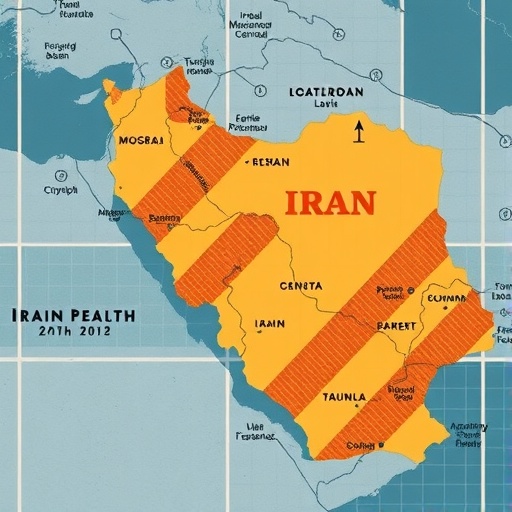
In recent years, the spotlight has increasingly turned to the health policies concerning migrant populations worldwide. With the ongoing migration crises globally, particularly in regions like the Middle East, the implications of health policies on this vulnerable demographic have become an essential subject for academic and governmental discourse. A comprehensive examination of these policies is critical not only for the migrants themselves but also for the host nations as they grapple with unique health challenges. A recent study conducted by researchers in Iran delves deep into the intricacies of migrant health policies, highlighting both successes and shortcomings in the framework designed to support this population.
The study, spearheaded by a team of experts, including Ghiasi, Mosadeghrad, and Dargahi, serves as a crucial analysis of the existing health policies tailored for migrants in Iran. Through meticulous research methodologies and extensive fieldwork, the authors reveal significant insights into how these policies are structured, who they benefit, and the areas requiring urgent reform. Their findings are particularly pertinent considering Iran’s geopolitical landscape, where it serves as both a transit and host country for millions of migrants from various backgrounds.
Health policies for migrants are often a reflection of a nation’s broader social and political climate. In Iran, the influx of migrants has been influenced by factors like economic instability, regional conflicts, and natural disasters, pushing individuals and families to seek refuge and better living conditions. The government’s approach towards migrant health has thus been multifaceted, involving international organizations and local health agencies to create a more inclusive health system. However, the study outlines that while efforts have been made to incorporate migrants into the national health framework, gaps still persist, leaving many in precarious situations regarding access to care.
An essential highlight of the study is the differentiation between formal and informal migrants within Iran. Formal migrants, those who have been granted legal residency or refugee status, often have more access to health services compared to informal migrants, who work in the shadows of the economy. The research indicates that the lack of recognition for informal migrants within health policies leads to significant health disparities, not only affecting their wellbeing but also posing public health risks for the communities they inhabit.
The researchers also emphasize that health policies need to take a holistic approach that encompasses various aspects of migrant life, including mental health, reproductive health, and preventative care. Many migrants experience trauma due to their journey, and without adequate mental health support, the impact can ripple through their communities, creating larger societal burdens. Engaging with these complexities in health policy is crucial, as it is not merely a matter of healthcare access but also of societal integration and cohesion.
Inclusive health policies benefit not just migrants but the entire population of host countries. The study identifies best practices from various regions which have successfully integrated migrants into their healthcare systems, suggesting that Iran could adopt similar strategies. These include community health programs that engage migrants in their healthcare journeys, providing culturally sensitive care that respects diverse backgrounds while promoting health literacy.
Despite the progress made, significant challenges remain. The study points out barriers such as xenophobia, discrimination, and varying levels of public awareness around migrant health issues. Addressing these societal attitudes is vital for creating an environment that fosters health equity. Education campaigns, aimed at local populations, can play a pivotal role in bridging understanding and empathy, thereby promoting a more inclusive approach to health policies.
Moreover, the researchers note the significance of collaboration among various stakeholders, including government bodies, NGOs, and international agencies, in strengthening migrant health policies. A concerted effort to analyze data, share best practices, and develop comprehensive health strategies can enhance outcomes for migrants. The study underscores the need for more research on migrant health, calling for longitudinal studies to explore the long-term effects of current health policies and interventions.
Finally, the implications of the findings are not limited to Iran but extend to a global audience, as countries worldwide align their policies in response to increasing movements of people. As regions grapple with the implications of climate change, conflict, and economic upheaval, the lessons learned from Iran’s experience can offer valuable insights into creating more effective and humane health policies for migrants everywhere.
This vital research contributes to the existing body of knowledge on migrant health policies and serves as a call to action for policymakers and health practitioners alike to prioritize the health and wellbeing of migrant populations. The future of health equity relies on the ability to adapt and innovate policies that are inclusive and responsive to the needs of all members of society.
Subject of Research: Migrant health policies in Iran
Article Title: An analysis of migrant health policies in Iran
Article References:
Ghiasi, K., Mosadeghrad, A.M., Dargahi, H. et al. An analysis of migrant health policies in Iran.Health Res Policy Sys 23, 75 (2025). https://doi.org/10.1186/s12961-025-01336-6
Image Credits: AI Generated
DOI: 10.1186/s12961-025-01336-6
Keywords: migrant health, health policy, Iran, public health, healthcare access, health equity, refugees, public health risks.
Tags: academic analysis of health policiescomprehensive examination of health policiesgeopolitical influences on migrant health policieshealth framework for refugeeshealth implications for host nationshealth policies for migrant populationsIran migrant health policyMiddle East migration crisesmigrant health challengesmigrant health research in Iransocio-political factors in migrant healthsuccesses and shortcomings in health frameworks





